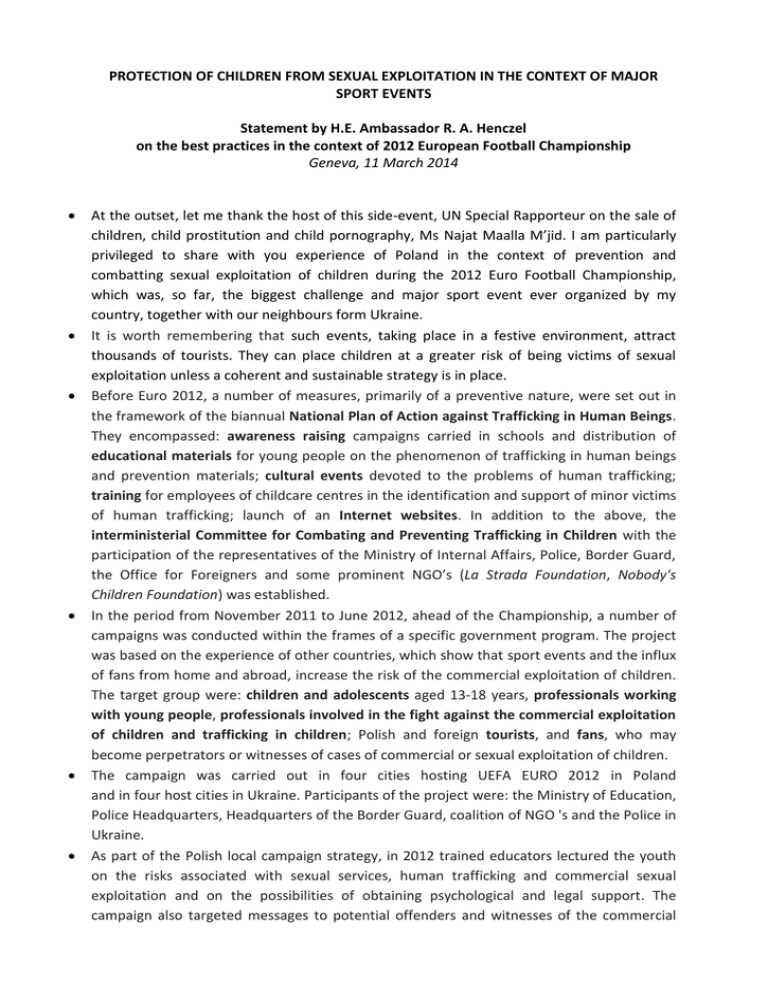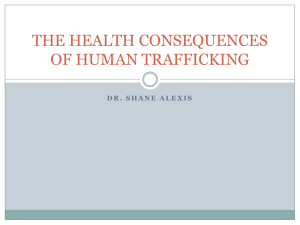PROTECTION OF CHILDREN FROM SEXUAL EXPLOITATION IN THE CONTEXT OF... SPORT EVENTS Statement by H.E. Ambassador R. A. Henczel
advertisement

PROTECTION OF CHILDREN FROM SEXUAL EXPLOITATION IN THE CONTEXT OF MAJOR SPORT EVENTS Statement by H.E. Ambassador R. A. Henczel on the best practices in the context of 2012 European Football Championship Geneva, 11 March 2014 At the outset, let me thank the host of this side-event, UN Special Rapporteur on the sale of children, child prostitution and child pornography, Ms Najat Maalla M’jid. I am particularly privileged to share with you experience of Poland in the context of prevention and combatting sexual exploitation of children during the 2012 Euro Football Championship, which was, so far, the biggest challenge and major sport event ever organized by my country, together with our neighbours form Ukraine. It is worth remembering that such events, taking place in a festive environment, attract thousands of tourists. They can place children at a greater risk of being victims of sexual exploitation unless a coherent and sustainable strategy is in place. Before Euro 2012, a number of measures, primarily of a preventive nature, were set out in the framework of the biannual National Plan of Action against Trafficking in Human Beings. They encompassed: awareness raising campaigns carried in schools and distribution of educational materials for young people on the phenomenon of trafficking in human beings and prevention materials; cultural events devoted to the problems of human trafficking; training for employees of childcare centres in the identification and support of minor victims of human trafficking; launch of an Internet websites. In addition to the above, the interministerial Committee for Combating and Preventing Trafficking in Children with the participation of the representatives of the Ministry of Internal Affairs, Police, Border Guard, the Office for Foreigners and some prominent NGO’s (La Strada Foundation, Nobody's Children Foundation) was established. In the period from November 2011 to June 2012, ahead of the Championship, a number of campaigns was conducted within the frames of a specific government program. The project was based on the experience of other countries, which show that sport events and the influx of fans from home and abroad, increase the risk of the commercial exploitation of children. The target group were: children and adolescents aged 13-18 years, professionals working with young people, professionals involved in the fight against the commercial exploitation of children and trafficking in children; Polish and foreign tourists, and fans, who may become perpetrators or witnesses of cases of commercial or sexual exploitation of children. The campaign was carried out in four cities hosting UEFA EURO 2012 in Poland and in four host cities in Ukraine. Participants of the project were: the Ministry of Education, Police Headquarters, Headquarters of the Border Guard, coalition of NGO 's and the Police in Ukraine. As part of the Polish local campaign strategy, in 2012 trained educators lectured the youth on the risks associated with sexual services, human trafficking and commercial sexual exploitation and on the possibilities of obtaining psychological and legal support. The campaign also targeted messages to potential offenders and witnesses of the commercial sexual exploitation of children, including provisions of Polish criminal law. This project has been placed in the last year in the manual of the European Crime Prevention Network "Evaluation of projects for the prevention of crime" as an example of good practice in the implementation of the crime prevention initiatives. Another phenomenon associated with the said crime is children's sex - tourism, which may be associated with the major events of an international nature - in this area Polish Police cooperated with law enforcement agencies of other countries, such as the United States and the Great Britain, particularly with regard to traveling individuals who have been convicted or traded for sexual offenses against children and/or offenses related to child pornography. With regard to child pornography, this phenomenon in Poland is marginal - in recent years there was recorded fact of the formation of paid sites with child pornography created by the Polish citizens. This applies also to the production of child pornography, in particular for commercial purposes - like production of films or pornographic images involving minors. However, steady increase in the availability of the Internet has caused the emergence of a new phenomenon, previously unseen in Poland: child-grooming or seduction of children for sexual purposes with the use of information technology. Perpetrators using the Internet encourage child to participate in sexual activities, for example by the promise of reward, or by discussing intimate behaviours or by presenting pornographic content in order to overcome resistance regarding sexual sphere. These contacts often have one goal - to arrange a physical meeting and, in consequence the sexual exploitation of a child. Regarding the fight against this crime, Polish Police took efforts to effectively combat online predators. Police has been authorized to use the methods of operational work such as, operational control or undercover operations which are effectively used by law enforcement agencies of other countries such as the US, Canada or France in the prosecution of crimes committed by the perpetrators of paedophile using Internet. In connection with the organization of the UEFA European Football Championship EURO 2012 police found no increase in the risks associated with the above mentioned crimes. However, our activity in the sphere of combatting sexual exploitation did not end. Currently child victims of trafficking can benefit from professional support of National Intervention and Consultation Centre for Polish and foreign victims of trafficking (NCCI), which provides assistance, including shelter, medical and psychological care and, in the case of foreign children - interpreter’s support for foreigners, and the organization of a safe return to their country of origin. According to the specific data, in the years 2012 - 2013 NCCI assisted 34 children - potential victims of trafficking.



